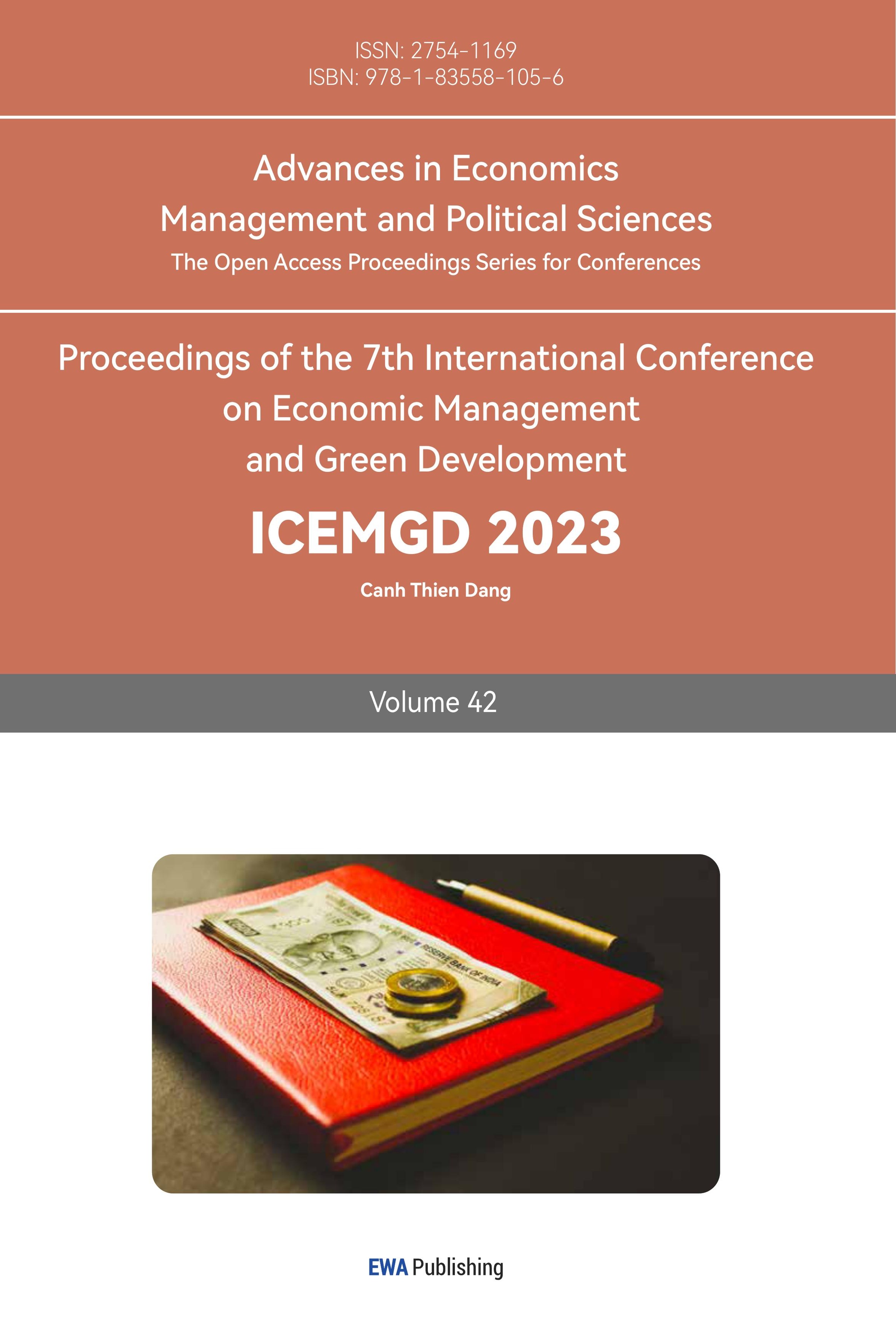1. Introduction
The past decades have seen a considerable upswing in the number of globally mobile students, a continuation of the globalization trend, seeking to bolster their competitiveness in the job market. Studying abroad is increasingly recognized as a crucial transformative experience for tertiary education students [1]. According to the 2022 Chinese Study Abroad Development Report, the number of Chinese students pursuing international studies peaked at 1,061,511 in 2019, a 6.4% increase from 2018.In 2018, 662,100 Chinese students pursued their studies overseas [2]. This figure included 30,200 state-sponsored students, 35,600 sponsored by various organizations, and a significant majority of 596,300 self-funded students [2]. The year witnessed an increase of 53,700 students, or 8.83%, from the 2017 statistics [2]. Furthermore, there was a rise of 8.00% or 38,500 in the number of students returning to China [2]. In the academic year 2019-2020, China remained the primary source of international students, with close to one million students attending higher education institutions abroad. The United States, Australia, the United Kingdom, Canada, and Japan emerged as the top five destinations [3]. However, future trends indicate a likely shift towards European and Asian countries, owing to international politics and visa-friendly policies. Many European countries have introduced attractive policies for Chinese students [3]. The aspiration among Chinese students is that international study experiences will augment their job prospects and career growth.
In the wake of the pandemic, an increasing number of Chinese international students opted to return home for employment. In 2020, the number of returning Chinese students surged by 33.90% from the previous year, nearly tripling the 2019 figure [4]. In 2021, the number of Chinese students returning to China for work was projected to surpass one million for the first time, reaching 1.049 million, a 35.01% annual increase [4].
Given these trends, there is heightened interest in the employment circumstances of returning overseas students. The focal point of concern is whether international study experiences will prove advantageous for future employment prospects. However, existing reports primarily dwell on the current state of returning overseas students in China without a detailed analysis of the impact of international study experiences on employment and the underlying reasons. This article aims to provide an in-depth analysis of the benefits and drawbacks of studying abroad to assist students in making well-informed decisions at crucial junctures in their lives instead of merely following the crowd.
2. Analysis of Employment Status of Chinese Overseas Students
Figure 1 demonstrates that, on average, the talent competitiveness of overseas students surpasses that of domestic graduates. The Talent Competitiveness Index, based on employers' search and interaction behaviors within diverse enterprises, mirrors the favorability of businesses towards talents. A higher index signifies greater interest from enterprises in talent, thus indicating a higher level of talent competitiveness. The chart below reveals that overseas students have consistently outperformed domestic graduates in terms of competitiveness.
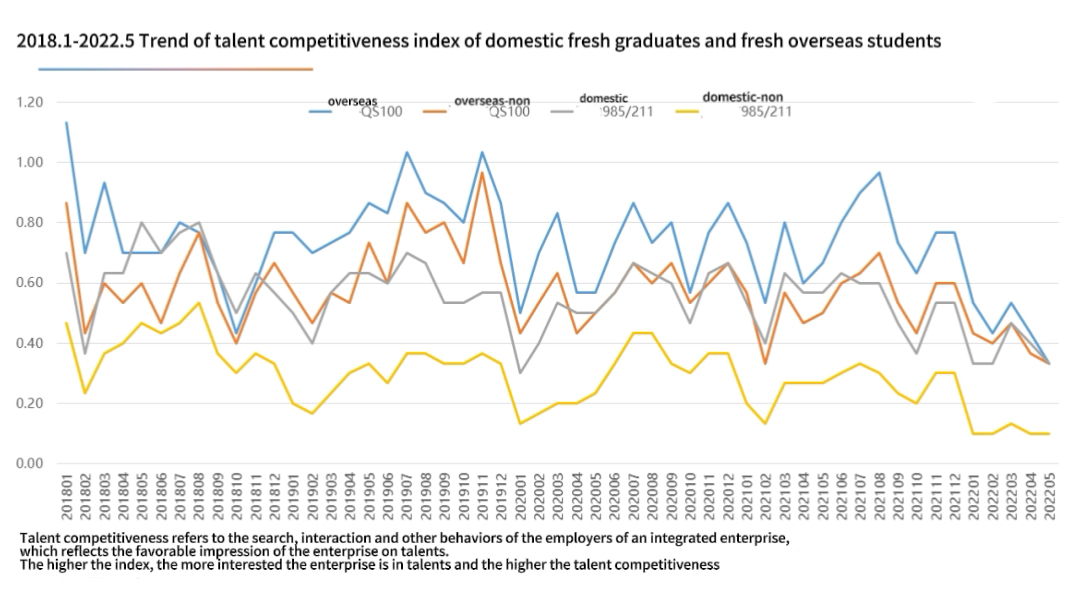
Figure 1: 2018.1 to 2022.5 Talent competitiveness index trend of domestic fresh graduates and fresh overseas students.( Source: Liepin Big data)
Over the past year, considering the delivery and response rates of QS100, non-QS100, domestic 985/211, and non-985/211 graduates, the response rate for both overseas QS100 and non-QS100 graduates stood at 0.35, exceeding that of domestic graduates. This underscores that businesses tend to favor fresh graduates from overseas [5].
Figure 2 indicates that over the last year, 65.35% of businesses recruited overseas students. The sectors with the most substantial HR distribution were finance, culture, education and media, electronic communication, pharmaceutical and healthcare, and the internet. These industries demonstrated the highest demand for international students [5].
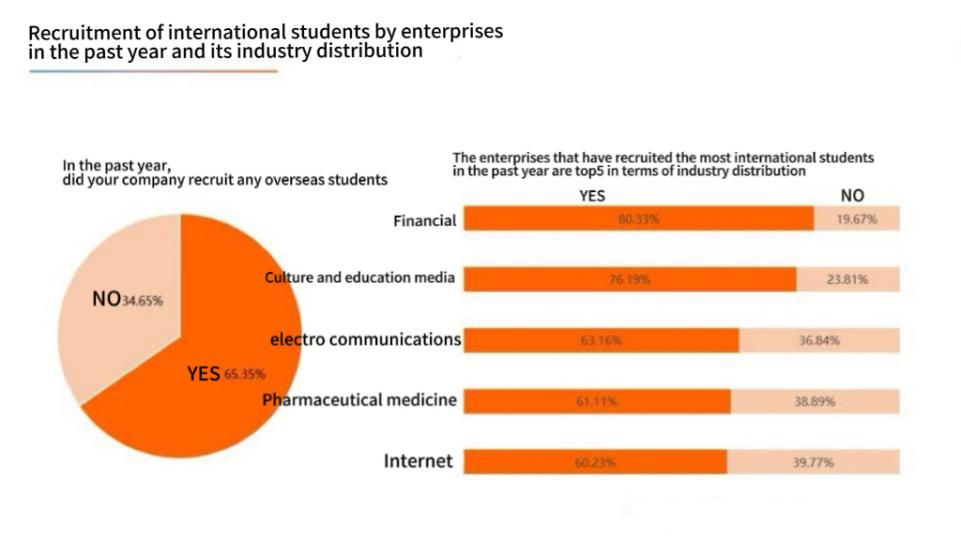
Figure 2: 2021.2 to 2022.5 The survey data of enterprise HR is about whether they have recruited overseas students, and the rate of each industry that has recruited overseas students in the past year.(Source: Liepin Big data)
Figure 3 illustrates that 57.67% of employment in foreign affairs and translation roles favored hiring international students, while international students accounted for 40% of the brand, marketing, new media, and similar roles. Additionally, international students secured approximately one-third of employment opportunities in product operation roles.
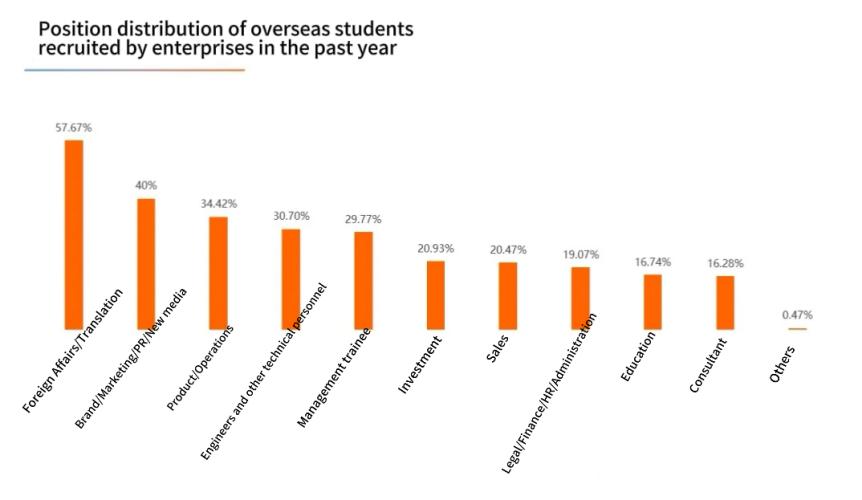
Figure 3: 2021.2 to 2022.5 Position distribution of overseas students recruited by enterprises in the past year.(Source: Liepin Big data)
As a distinct group, overseas students, hone their independence, critical thinking, intercultural communication abilities, and global perspective in foreign educational environments [2]. These are all essential skills for China's future progression. Consequently, these returned students hold a particular advantage in domestic career advancement [2]. However, the growing wave of returned students also implies intensified competition, with previously subtle issues emerging [2].
3. The Superiority of Overseas Study Experience on the Employment of Chinese Overseas Students
Big data surveys indicate that the number of Chinese students returning home for employment has surged post-pandemic. Specific sectors, including bio-medicine and equipment manufacturing, show heightened demand for international students, given the current scarcity of professionals in these fields within China [6]. Studying abroad provides students with an advanced and comprehensive knowledge base, equipping them with a more thorough understanding than is possible within China. As China's rapid development necessitates these advanced, knowledge-based talents, the supply and demand for returning students have increased simultaneously, signaling an upward trend [6].
Studying abroad exposes students to the influence of Western culture and education for an extended period, leading to a fusion of Chinese and Western cultures. The resultant diversified values are evident in their professional lives, allowing them to break free from linear thinking and approach tasks from various angles [7]. Yuanguang Huang from Zijin Mining Group Company Limited noted that "compared to domestic graduates, overseas students generally possess superior foreign language skills and can quickly adapt to overseas work environments due to their international study, life, and work experiences. They understand cultural differences and are well-prepared mentally and psychologically for global employment, making them well-suited for overseas roles" [4].
Overseas students are more likely to secure higher-paying jobs compared to their domestically-educated counterparts, with the average salary for returning students in 2022 reaching 14,680 yuan per month, a 7% increase from the previous year [6]. A survey by LIEPIN on enterprise HR revealed that 80.85% of HR professionals believe that, all else being equal, international study experience is a distinct advantage for candidates [5]. Looking at university recruitment as an example, many energetic returnees are absorbed into academia [7]. These individuals brim with creativity, providing a fresh impetus to higher education and scientific research. Furthermore, their youthfulness and flexibility enable them to apply their knowledge to pedagogical practices efficiently and establish a progressive teacher-student dynamic. This factor significantly enhances the quality of student training, making the trend of younger returnees unavoidable [7].
In addition to corporate preference for overseas students, several Chinese cities have implemented talent policies to attract these students [4]. For instance, Shanghai's "Pujiang Talent Plan" offers 150,000 to 500,000 yuan to overseas students coming to Shanghai for work or to start their businesses. Metropolises like Chengdu and Guangzhou also provide financial aid [4].
Overseas study experiences also confer the advantage of bilingualism, expand personal networks, and broaden international perspectives, positively impacting career prospects [6]. Studying abroad exposes students to diverse cultural, historical, social, economic, and other facets of knowledge, thereby expanding their international vision, cognitive abilities, and cross-cultural communication skills [6]. This advantage enables students to manage relationships with colleagues effectively and to excel at handling international business, liaising or collaborating with foreign companies [6]. While studying abroad, international students are required to use the target language for daily life, academic studies, and social activities, thereby enhancing their language proficiency and oral expression. These language skills make international students more competitive when applying for language-related roles, such as translator or interpreter positions [6]. The experience of studying abroad fosters independence, problem-solving abilities, and decision-making skills, boosting students' self-confidence and personal growth. These experiences can lead to greater comfort and success in future work and personal life.
4. The Inferiority of Overseas Study Experience on the Employment of Chinese Overseas Students
Studying abroad can also yield negative effects on students' employment prospects. A survey conducted in 2019 and 2020 on individuals who had studied abroad and were now employed presented results in the form of a matrix graph [3]. From this graph, it is evident that many students believe that life overseas results in a lack of internship and work experience. International students often struggle to find internships related to their field of study, while the shorter duration of their programs compared to domestic students, coupled with high academic pressure, leaves little time for internships. Many companies prioritize hiring individuals with rich internship experiences, a criterion that international students often lack.
However, issues like asymmetric employment information for returning students are prevalent [2]. Many students are uninformed about their choice of major and career prospects before going abroad. Despite the internet and social media reducing communication barriers, these students often lack a comprehensive understanding of the domestic economic environment and employment requirements. Consequently, on their return, they struggle to find suitable job opportunities in line with their qualifications, leading to an underutilization of their talents [2]. According to the Center for China and Globalization, in 2018, 80% of overseas students who returned to China thought that their income after returning to China was lower than their psychological expectation, and the proportion was 69% in 2017, indicating that more and more overseas students' expectation of returning to China for employment is higher than the reality, and there are contradictions and gaps [2]. At the same time, 72% of overseas students think that the work they are engaged in does not match their major in studying abroad [2]. Many international students aspire to recoup their study-abroad expenses within the first few years of working, given the high costs associated with overseas education, especially in Western countries [2]. However, many students find themselves working for several years to recover these costs, potentially resulting in a net loss. Thus, the high cost of studying abroad can be considered an investment that may yield profits, but also carries the risk of loss, a potential negative outcome [2].
Moreover, readjustment to their home country becomes increasingly challenging the longer these students stay abroad [2]. This difficulty arises not only due to their acclimatization to the overseas academic and professional environment but also the rapid advancements in China, which can make the familiar seem foreign [2].
Additionally, they encounter social complexities and the need for networking, which require investments in personal connections and social interactions. It is a gradual process of adaptation for international students [2]. According to statistics from the Center for China and Globalization, only 48% of overseas returnee students can smoothly integrate into the current Chinese society, while 48% face difficulties and need time to integrate, and 3% are unable to integrate at all [2]. Overseas returnee students encounter challenges in social integration, which requires joint efforts from individuals and various sectors of society to address and resolve these integration difficulties [2].
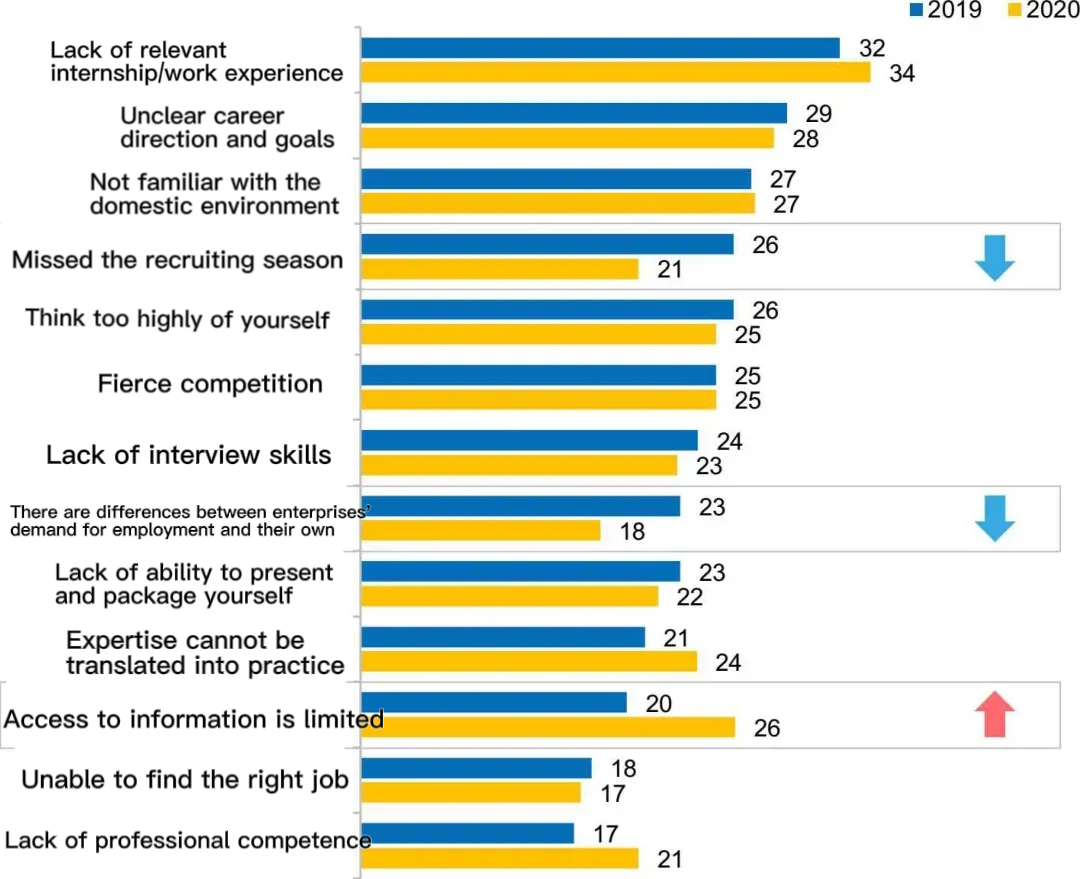
Figure 4: 2019 to 2020 A survey was conducted on individuals who had studied abroad and had already worked.(Source. CCG)
5. Interviews with Overseas Students Returning to China to Find Jobs
To further understand the circumstances of overseas students returning to China, we conducted interviews with a few individuals who had recently returned from studying abroad.
One of the interviewees, Anna, is a graduate of University College London where she earned a degree in financial engineering. She completed her undergraduate studies at the University of Manchester and then pursued her postgraduate degree at University College London. Interestingly, she received a job offer from a British company offering a good annual salary. However, upon returning to China, she sent her resume to the top 500 companies and received many responses. "Studying in the UK was challenging, from adapting to a new environment to enduring late-night study sessions during finals week. However, when I received multiple job offers and saw the salary packages they were offering, I felt that all the efforts were worth it," Anna shared, reflecting on her experience in the UK. Her job hunt was successful, and she was eventually employed by Bytedance, where she was offered a good salary.
However, not all students experience such a smooth transition. In contrast, we interviewed a 25-year-old man named Hu who graduated from the University of Sydney with a degree in finance. Initially, he enrolled at the China University of Mining and Technology, but after a year, he felt an overseas university would offer more advantages. Consequently, he transferred to the University of Sydney to study finance. After earning his bachelor's and master's degrees, he returned to China in search of employment. Unfortunately, high-paying jobs did not appeal to him, while jobs with moderate pay did not meet his requirements. His degree did not provide him with an advantage in the job market, causing him considerable distress and anxiety. Ultimately, he decided to pursue a doctorate in economics at Nanjing Agricultural University to delay entering the job market while adding competitiveness to his resume.
In his interview with us, Hu expressed regret: "As a freshman at the China University of Mining and Technology, I felt very unfit for the learning environment. My classmates were hardworking, which put a lot of pressure on me and made me anxious about my future. Therefore, I resolutely decided to study economics at the University of Sydney, Australia. Initially, my parents did not support my choice, so they did not provide me with sufficient living expenses. While studying in Australia, I had to work part-time to support myself. Life was tough. I thought happiness would come after all the hardships, but I did not anticipate the difficulty of finding a job upon returning to China. I had no choice but to go back to school to continue my studies. Now, I deeply regret my choice. I should have completed university in China and found a satisfactory job."
6. Results and Conclusion
The in-depth analysis presented above delineates a nuanced perspective of the benefits and pitfalls of overseas education. It underscores that studying abroad cannot be simplistically categorized as wholly good or bad, but rather, it's a complex, challenging undertaking fraught with both potential rewards and risks. The analysis stresses the significance of choosing a path that's tailored to personal inclinations and potential, as opposed to succumbing to societal pressures or popular trends.
As the global competition for talent intensifies in the 21st century, the impact and relevance of an international education have come to the fore, demonstrating an unmistakable shift towards globalization [8]. For students who stand on the precipice of this decision, the encouragement is to embrace the adventure, step boldly beyond national borders and immerse themselves in the international arena. On a personal level, studying abroad offers an array of advantages, including but not limited to improved foreign language proficiency, access to state-of-the-art knowledge and technology, broadened intellectual and cultural horizons, and the cultivation of valuable traits such as self-confidence, independence, and resilience [8].
Viewed through the lens of national interest, those who study abroad and then return home can serve as valuable catalysts for industrial development. This role is two-fold: on one hand, the infusion of highly educated returnees into Chinese corporations could significantly bolster their growth [9]. On the other hand, these same returnees can serve as crucial bridges, helping domestic enterprises extend their reach into international markets and thereby promoting the course of globalization [9].
However, a significant caveat accompanies these potential benefits. If society or the market fails to recognize and harness the unique advantages brought by these internationally educated students, or if no measures are put in place to assist in mitigating their challenges, it could result in the suboptimal utilization of this talent pool [2]. The resultant waste of national resources not only undermines the return on investment for individuals who opt for studying abroad but could also lead to mental health issues. This scenario is a loss for the individual and society alike, underscoring the critical need for a balanced and supportive approach to integrating these overseas talents [2].
References
[1]. Heinzmann et al. (2022) Studying Abroad During the Outbreak of the COVID-19 Pandemic: Two Case Studies. Frontiers: The Interdisciplinary Journal of Study Abroad; Nov2022, Vol. 34 Issue 4, p305-316, 12p
[2]. Hu Zheng-pu (2020) The Analysis of Employment Issue in Chinese Returned Studying Abroad Students China: Academic Journal Electronic Publishing House
[3]. CCG and Bank of China. (2022), Annual Report on The Development of Chinese Students Studying Abroad(2022), Social Sciences Academic Press: Blue Book of Global Talent.
[4]. LinkedIn. (2022) Insight Report on Returning Chinese Students seeking Jobs in 2022. Available at: 2022-chinese-overseas-student-report.pdf (linkedin.com)
[5]. Liepin(2022) Insight Report on employment competitiveness of 2022 overseas fresh students. Available at:https://www.199it.com/archives/1459942.html
[6]. CCG and Zhilian(2019), Report on Employment&Entrepreneurship of Chinese Returnees 2019, Available at: https://www.ccg.org.cn/archives/62245
[7]. Zhang Nan(2021) Study on the current situation of returnees from overseas study in universities
[8]. Zhang Wei (2022) Development Trends and China’s Action of Global Education on Study Abroad School of Education Science, Jiangsu Normal University, Xu Zhou 221116
[9]. Ren San(2022) With a history of more than 100 years of studying abroad, overseas returnees have entered the era of "circulation", CHINA’S FOREIGN TRADE , pp.74-76
Cite this article
Wang,Y. (2023). For Chinese Students Studying Abroad: A Study on the Influence of Overseas Study Experience on Returning Home to Find a Job. Advances in Economics, Management and Political Sciences,42,41-48.
Data availability
The datasets used and/or analyzed during the current study will be available from the authors upon reasonable request.
Disclaimer/Publisher's Note
The statements, opinions and data contained in all publications are solely those of the individual author(s) and contributor(s) and not of EWA Publishing and/or the editor(s). EWA Publishing and/or the editor(s) disclaim responsibility for any injury to people or property resulting from any ideas, methods, instructions or products referred to in the content.
About volume
Volume title: Proceedings of the 7th International Conference on Economic Management and Green Development
© 2024 by the author(s). Licensee EWA Publishing, Oxford, UK. This article is an open access article distributed under the terms and
conditions of the Creative Commons Attribution (CC BY) license. Authors who
publish this series agree to the following terms:
1. Authors retain copyright and grant the series right of first publication with the work simultaneously licensed under a Creative Commons
Attribution License that allows others to share the work with an acknowledgment of the work's authorship and initial publication in this
series.
2. Authors are able to enter into separate, additional contractual arrangements for the non-exclusive distribution of the series's published
version of the work (e.g., post it to an institutional repository or publish it in a book), with an acknowledgment of its initial
publication in this series.
3. Authors are permitted and encouraged to post their work online (e.g., in institutional repositories or on their website) prior to and
during the submission process, as it can lead to productive exchanges, as well as earlier and greater citation of published work (See
Open access policy for details).
References
[1]. Heinzmann et al. (2022) Studying Abroad During the Outbreak of the COVID-19 Pandemic: Two Case Studies. Frontiers: The Interdisciplinary Journal of Study Abroad; Nov2022, Vol. 34 Issue 4, p305-316, 12p
[2]. Hu Zheng-pu (2020) The Analysis of Employment Issue in Chinese Returned Studying Abroad Students China: Academic Journal Electronic Publishing House
[3]. CCG and Bank of China. (2022), Annual Report on The Development of Chinese Students Studying Abroad(2022), Social Sciences Academic Press: Blue Book of Global Talent.
[4]. LinkedIn. (2022) Insight Report on Returning Chinese Students seeking Jobs in 2022. Available at: 2022-chinese-overseas-student-report.pdf (linkedin.com)
[5]. Liepin(2022) Insight Report on employment competitiveness of 2022 overseas fresh students. Available at:https://www.199it.com/archives/1459942.html
[6]. CCG and Zhilian(2019), Report on Employment&Entrepreneurship of Chinese Returnees 2019, Available at: https://www.ccg.org.cn/archives/62245
[7]. Zhang Nan(2021) Study on the current situation of returnees from overseas study in universities
[8]. Zhang Wei (2022) Development Trends and China’s Action of Global Education on Study Abroad School of Education Science, Jiangsu Normal University, Xu Zhou 221116
[9]. Ren San(2022) With a history of more than 100 years of studying abroad, overseas returnees have entered the era of "circulation", CHINA’S FOREIGN TRADE , pp.74-76





